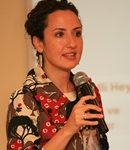Nearly a year ago, I wrote about the value of initiatives that create space for reflection, learning and mutual support among people working in the area of social change, and the tremendous contribution they make in our journey. Last week, I finished a report for a European foundation looking to support programs in a rural city in south-western Turkey. I described the loneliness local champions were feeling in their pursuit to make a difference. So isolated, but still so motivated and determined, I could only imagine the multiplier effect of connecting them to others that can help to further their mission.
From my discussions and observations, I can see that those ‘others’ who are connected to this rural city – government officials, companies, small business owners, diaspora philanthropists – are actually in much closer proximity than they appear to be (much like the required safety warning on the side view mirrors of cars: ‘Objects in the mirror are closer than they appear’. However, it still takes someone even just one step away to see this – and to initiate the process of bringing people, organizations and resources together.
BMW Foundation seems to be just one step far enough to see that in order to foster social change, we must convene not only among ourselves (ie only NGOs, only foundations, and so on) but also with others from different sectors and perspectives. Over the course of my work in the philanthropic sector, I have been privileged to attend a number of different forums and events that have allowed me to connect to and share experiences with colleagues from across the world. Yet having just returned from the 2nd Arab European Young Leaders Forum, organized by the BMW Foundation in Tunis, I am even more acutely aware of the value of spaces that allow for inter-disciplinary exchanges of ideas and approaches to social change. In a meeting with about 40 participants, to my left sat an Egyptian-German man working on nano-scaled technologies in the Middle East; to my right, a Tunisian medical doctor-turned-activist who was one of the first citizens to go to the streets and rally for democracy and freedom. Across from me sat the CEO of a major American company branch in north-east Africa. Next to him was a journalist and next to her, a representative from the Tunisian government… and so on.
Over the course of two very intense days, I welcomed the challenge of explaining to colleagues the scope of my work in the non-profit and philanthropic sector – something I take for granted as I am usually surrounded by a majority of people who are from the same sector. Through a diverse set of viewpoints and lenses, we discussed developments in the Arab world and visited Tunisian leaders promoting democratization via programs such as parliamentary monitoring groups and civic action buses touring the country encouraging citizens to vote. We worked in small groups to share our knowledge and experience with colleagues, helping them refine and develop their own work – which included social investment models and a social enterprise tour company that promotes understanding and tolerance.
These 48 hours served to once again remind me of the critical importance of organizations like BMW Foundation that help us see that we are closer to one another than we appear to be. Reflecting on my own role of working with community leaders to develop strategies and programs for social change, it served as a valuable reminder of the value we can add by being ‘one step away’ and thus bringing together people, organizations and resources together to firmly secure the roots of social change.
Filiz Bikmen is a philanthropic consultant and vice chair of the International Center for Not for Profit Law




Comments (0)